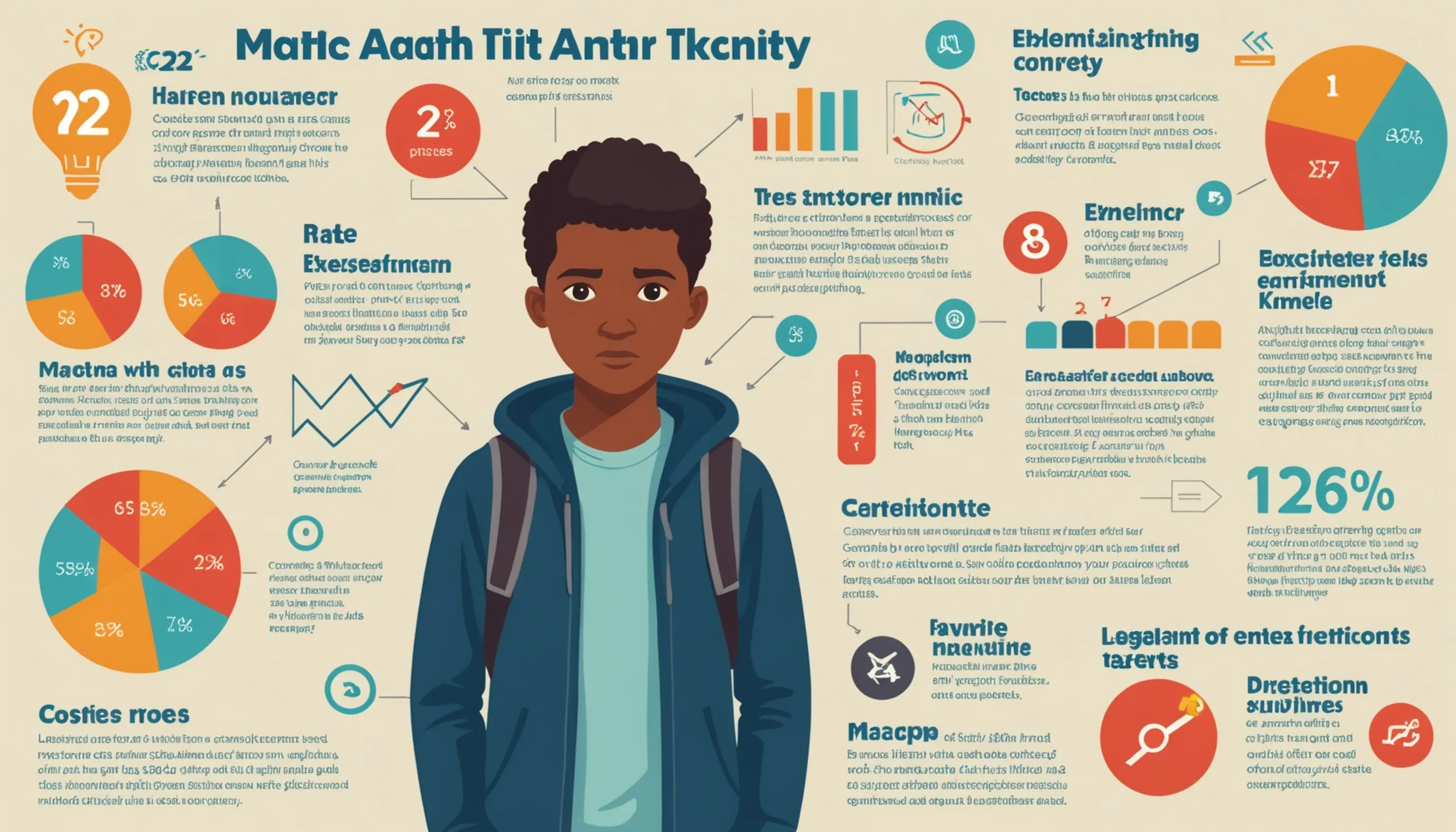Afraid of Math: Understanding Math Anxiety
 HvWHenry van Wagenberg
HvWHenry van Wagenberg
Understanding Math Anxiety in Teenagers
Understanding math anxiety in teenagers is crucial for parents & teachers. This condition can significantly hinder a teen's ability to perform well in math, leading to a cycle of fear & avoidance. Math anxiety often manifests as a feeling of dread or panic when faced with mathematical tasks, which can stem from various factors, including previous negative experiences or societal pressures.
Recognizing that math anxiety is a common issue can help adults provide better support. By fostering open communication, teens can express their struggles, paving the way for effective strategies to manage their fears.
What is Math Anxiety?
Math anxiety is a psychological condition characterized by a deep-seated fear & apprehension related to mathematics. It can manifest in various ways, such as feelings of panic during math tests, avoidance of math-related activities, or a belief that one is inherently bad at math. This anxiety can affect a teenager’s overall academic performance, self-esteem, & willingness to engage in math-related subjects.
At its core, math anxiety is not just about struggling with numbers; it often arises from a combination of personal experiences, societal expectations, & educational environments. For instance, if a teen has faced repeated challenges in math or has been criticized for their performance, they may develop a fear of failure. This fear can create a cycle where the anxiety interferes with their ability to learn, leading to further struggles.
Research indicates that math anxiety can also be contagious. If a parent or teacher expresses their own math fears, it can transfer to the teen, reinforcing negative beliefs about their abilities. Furthermore, societal stereotypes, such as the notion that boys are better at math than girls, can exacerbate feelings of inadequacy.
Addressing math anxiety requires a multifaceted approach, including understanding its origins, recognizing its symptoms, and implementing supportive strategies to help teens regain confidence in their mathematical abilities. By fostering a nurturing environment, adults can play a pivotal role in helping teens overcome their fears.
Signs Your Teenager is Afraid of Math
Recognizing the signs that your teenager is afraid of math is crucial for timely intervention. Here are some common indicators that may suggest your teen is experiencing math anxiety:
- Avoidance Behavior: If your teen consistently avoids math-related tasks or activities, such as homework, math clubs, or even discussions about math, this may indicate a fear of the subject.
- Physical Symptoms: Watch for physical signs of distress, such as sweating, shaking, or a racing heart when faced with math challenges. These symptoms can be indicators of anxiety.
- Negative Self-Talk: If your teen frequently expresses feelings of inadequacy regarding math, stating things like "I’m just not good at math," it can reflect a deeper fear of failure.
- Declining Grades: A noticeable drop in math grades or performance can be a clear sign of anxiety. If your teen was once performing well and suddenly struggles, it may be worth investigating further.
- Frustration and Anger: If math homework leads to increased frustration or anger, it can indicate that your teen is overwhelmed by anxiety.
- Reluctance to Seek Help: A teenager afraid of math may hesitate to ask for help from teachers or peers, fearing judgment or embarrassment.
Recognizing these signs early can help you provide the necessary support and resources to help your teenager overcome their fears and build confidence in their math abilities.

Causes of Math Anxiety in Teens
Understanding the causes of math anxiety in teens is essential for addressing this prevalent issue. Several factors contribute to the development of anxiety surrounding mathematics, and recognizing them can help in devising effective solutions.
- Negative Experiences: Past experiences with math, such as poor grades or critical feedback from teachers, can create a lasting impression. If a teen struggles with a specific math concept and receives discouragement, it may lead to a fear of similar situations in the future.
- Parental Influence: The attitudes of parents towards math can significantly impact a teen's perception. If parents express their own math anxieties or frustrations, teens may internalize these feelings, believing that math is inherently difficult or unattainable.
- Peer Pressure: Social dynamics can exacerbate math anxiety. If a teenager compares themselves to peers who excel in math, they may feel inadequate and become fearful of their own abilities.
- High Stakes Testing: The pressure associated with standardized tests can heighten anxiety. Teens may worry about their performance and the implications it has for college admissions or scholarships.
- Teaching Methods: Traditional teaching methods that do not accommodate different learning styles can leave some students feeling lost. If the instruction does not resonate with a teen’s way of learning, frustration and anxiety can develop.
By identifying these underlying causes, parents & educators can create supportive environments that alleviate math anxiety and foster a more positive experience with mathematics.
How to Help Your Teen Overcome Math Fear
Helping your teen overcome math fear involves several supportive strategies. First, encourage open communication about their feelings toward math, allowing them to express their concerns without judgment. Next, promote a positive attitude by celebrating small victories and progress in their math skills. Consider introducing engaging resources, such as math games or interactive apps, to make learning enjoyable.
Additionally, create a structured study routine, which can reduce anxiety by providing predictability. Lastly, if their fear persists, seeking professional help from a math tutor or counselor may provide personalized strategies to build confidence and competence in math.
Encouraging a Positive Attitude Towards Math
Encouraging a positive attitude towards math is essential for helping teens overcome their fears and anxieties. Here are several effective strategies to foster this mindset:
- Model Positive Behavior: As a parent or teacher, demonstrate a positive attitude towards math. Share your own experiences, including challenges and successes, to show that learning is a journey.
- Use Positive Reinforcement: Celebrate achievements, no matter how small. Acknowledging progress can boost confidence and motivate further effort.
- Incorporate Real-Life Applications: Show how math is relevant in everyday life. Whether it’s budgeting, cooking, or planning a trip, real-world applications can make math more relatable and enjoyable.
- Encourage a Growth Mindset: Teach your teen that intelligence is not fixed. Emphasize that effort and persistence can lead to improvement. Encourage them to view mistakes as opportunities for learning rather than failures.
- Create a Supportive Environment: Ensure that your teen feels safe to ask questions & express confusion without fear of judgment. A supportive environment fosters open discussions about math.
- Engage in Collaborative Learning: Encourage group study sessions with peers. Working with friends can make math less intimidating and more enjoyable.
By consistently applying these strategies, you can help cultivate a more positive relationship with math for your teen, paving the way for improved confidence and performance in the subject.

Practical Tips for Reducing Math Anxiety
Reducing math anxiety in teenagers requires practical strategies that can be easily implemented at home or in the classroom. Here are several effective tips to help alleviate anxiety:
- Practice Relaxation Techniques: Encourage your teen to practice deep breathing or mindfulness exercises before tackling math tasks. These techniques can help calm their nerves and improve focus.
- Break Tasks into Smaller Steps: Large math problems can be overwhelming. Teach your teen to break down complex problems into manageable steps, making them easier to approach & solve.
- Use Positive Affirmations: Encourage your teen to use positive self-talk. Phrases like "I can improve my math skills" or "I am capable of solving this problem" can boost confidence and reduce anxiety.
- Establish a Routine: Create a consistent study schedule that includes regular math practice. A structured routine can provide a sense of control and predictability, reducing anxiety levels.
- Utilize Resources: Encourage the use of online resources, apps, or tutoring services that make learning math interactive & fun. Engaging tools can help demystify math concepts and reduce fear.
- Celebrate Effort, Not Just Results: Focus on the effort your teen puts into learning rather than solely on grades. Recognizing their hard work fosters resilience and a love for learning.
By implementing these practical tips, parents and teachers can create a supportive environment that helps teens manage their math anxiety and build confidence in their abilities.
When to Seek Professional Help for Math Anxiety
Knowing when to seek professional help for math anxiety is crucial for supporting your teenager. If you notice that their anxiety significantly interferes with daily activities, such as avoiding school or math-related tasks, it may be time to consult a professional. Additionally, if their anxiety leads to persistent low self-esteem, poor academic performance, or emotional distress, seeking help can provide valuable strategies and support. Professional tutors or counselors who specialize in learning difficulties can offer tailored approaches to address the root causes of math anxiety, helping your teen regain confidence and improve their skills.
Finding a Math Tutor or Counselor
Finding the right math tutor or counselor for your teenager can play a pivotal role in overcoming math anxiety. Here are some steps to help you navigate this process:
- Identify Needs: Begin by assessing your teenager's specific challenges in math. Understanding whether they need help with foundational concepts, homework assistance, or test preparation will guide your search.
- Seek Recommendations: Ask teachers, friends, or family for recommendations on reputable tutors or counselors. Personal referrals can lead to trusted professionals who have experience working with teens.
- Check Qualifications: Look for tutors or counselors who have relevant qualifications and experience. They should possess a strong understanding of math concepts and be skilled in teaching methods that resonate with teens.
- Consider Specialization: Some professionals specialize in math anxiety or learning disabilities. Finding someone with this expertise can be particularly beneficial for your teen's situation.
- Meet for a Trial Session: Many tutors offer a trial session. This allows you and your teen to assess their teaching style and determine if it’s a good fit. Observing how the tutor interacts with your teen is crucial.
- Encourage Open Communication: Once you find a tutor or counselor, encourage your teenager to express their thoughts and feelings about the sessions. Open communication will ensure that their needs are being met.
By taking these steps, you can find a supportive math tutor or counselor who can help your teen build confidence and skills in math.
Resources for Parents and Teens
There are numerous resources available for parents and teens seeking to address math anxiety and improve math skills. Here are some valuable options:
- Online Tutoring Platforms: Websites like Khan Academy, Tutor.com, and Wyzant offer access to experienced tutors who can provide personalized lessons. These platforms often feature interactive tools and resources to help students grasp difficult concepts at their own pace.
- Math Anxiety Resources: Organizations like the National Association of School Psychologists provide helpful guides and articles specifically focused on understanding and addressing math anxiety. These resources can help parents learn more about the condition and effective strategies for support.
- Books and Workbooks: Several books focus on overcoming math anxiety, such as "The Math Myth" by Andrew Hacker or "Overcoming Math Anxiety" by Sheila Tobias. Workbooks designed for students can also provide practice and build confidence.
- Support Groups: Joining support groups for parents of teens with anxiety can provide a sense of community and shared experiences. These groups often share tips and resources that have been effective for their children.
- School Resources: Many schools offer counseling services or workshops focused on math skills and anxiety. Encourage your teen to speak with a school counselor who can provide additional support.
By utilizing these resources, parents can empower their teens to develop a more positive relationship with math and effectively manage anxiety.
